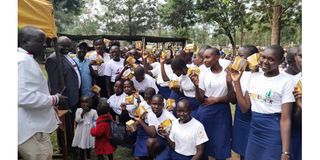Matungu school 'padding up' girls' dignity in war on period poverty

Mwira Secondary students display packets of sanitary pads during the launch of 'Pad a Girl' initiative in the school.
What you need to know:
- Many students at Mwira Mixed Secondary School in Kakamega County come from poor backgrounds.
- Poor menstrual hygiene poses health risks, including reproductive issues and urinary tract infections.
- Health experts agree that menstrual hygiene is part of basic health hygiene and one of the most fundamental issues concerning reproductive health.
A school in Kakamega has unveiled the ‘Pad a Girl’ initiative to eradicate menstrual poverty, restore dignity and good health, and promote retention in class.
Teachers at Mwira Mixed Secondary School in Matungu started with a WhatsApp group to share ideas and chart ways of improving performance in exams before they came up with the sanitary pads initiative.
“While we were sharing ideas, the staff and teachers from the Guiding and Counselling department said many girls were missing their lessons out of stigma from stained clothes as they attend their monthly periods. We started discussing how to address this challenge and that is how the idea of ‘Pad a Girl’ came up,” said Deputy Principal Christine Akinyi.
Female teachers took up the initiative with the aim of soliciting sanitary pads for the girls. “We started contributing the pads before we roped in our male counterparts. We then extended the initiative to the surrounding community and brought in former students,” added Ms Akinyi.
Empowerment
On June 14, the school sourced donations for 600 neediest cases out of its 822 girls. Principal Avugwi Muganda said the initiative was borne out of the need to empower young girls who were going through various forms of stigmatisation, abuse from boys and other health challenges as a result of menstruation.
“What ought to be a proud period in their lives turns into a dreadful period because they have little access to sanitary pads and this affects their convenience and self-esteem. They skip classes and it becomes a dream killer,” said Mr Muganda.
The initiative, according to the school head, is expected to be a long-term project that will bring in more partners and stakeholders to donate menstrual hygiene products. He said the project seeks to promote retention in class and enhance fair competition among boys and girls in both classwork and co-curricular activities.
Advocates for menstrual equity say the taboo around menstruation and the lack of access to menstrual products hurt girls and women economically because it costs them money for products and may keep them out of jobs and school.
Ms Jamila Mohammed, the managing director of Watitwa Foundation that partnered with the school to ‘pad the girls’, commended the teachers for stepping up efforts to help girls who often face challenges during their menstruation.
Risky alternatives
She said the struggle to access sanitary pads for most girls is real and those who cannot afford the towels usually resort to unhygienic materials like tissue paper, pieces of cloth, sponge and rags.
“They end up becoming commonly vulnerable to sexual abuse in their quest to seek money to buy menstrual pads. Some girls stay away from school during their menses and this affects their education negatively.
"I am supporting the ‘Pad a Girl’ initiative in the school so that we empower the girls who are faced with stigma and abuse whenever they ‘rain’. We want to reinforce the confidence of our girls to be proud of their menstrual cycle,” said Ms Mohammed, urging the school and like-minded stakeholders to source the pads on a quarterly basis, to sustain the initiative.
Some students acknowledged that they face both health and emotional challenges during menstruation but are shy to discuss them for fear of being stigmatised.
Judith Nambiro said the most common menstrual hygiene management challenges they face include the high cost of pads and poor knowledge of menstrual hygiene.
“Period poverty, where people cannot afford even the most basic of period supplies like pads, and lack of access to menstrual products and education, is an issue that is affecting most of us,” she said.
She said despite knowing that the use of pieces of cloth during periods is unhygienic, some girls have no option, as they need to cover themselves and stay clean.
Worrying statistics
According to Unesco, one in 10 girls in Africa misses school during her menstrual periods and eventually drop out.
A study by ZanaAfrica, a social enterprise operating in Kenya, found that 95 per cent of menstruating girls missed one to three school days, 70 per cent reported a negative impact on their grades, and more than 50 per cent stated falling behind in class because of menstruation discriminatory social norms and taboos. Stigma associated with menstruation can also lead girls to follow unsafe practices.
Poor menstrual hygiene poses health risks, including reproductive issues and urinary tract infections. Health experts agree that menstrual hygiene is part of basic health hygiene and one of the most fundamental issues concerning reproductive health.
The World Bank report of May 2022 on Menstrual Health and Hygiene states that about 500 million girls lack access to menstrual products and adequate facilities for menstrual hygiene management.
“The resulting lack of information about menstruation leads to unhygienic and unhealthy menstrual practices, and creates misconceptions and negative attitudes, which motivate, among others, shaming, bullying, and even gender-based violence.
"For generations of girls and women, poor menstrual health and hygiene is exacerbating social and economic inequalities, negatively impacting their education, health, safety, and human development,” reads the report.





